Vax-Pac Study: How to have better messaging and support on vaccines for parents of under-18s
By Blog Editor, IOE Digital, on 6 October 2022
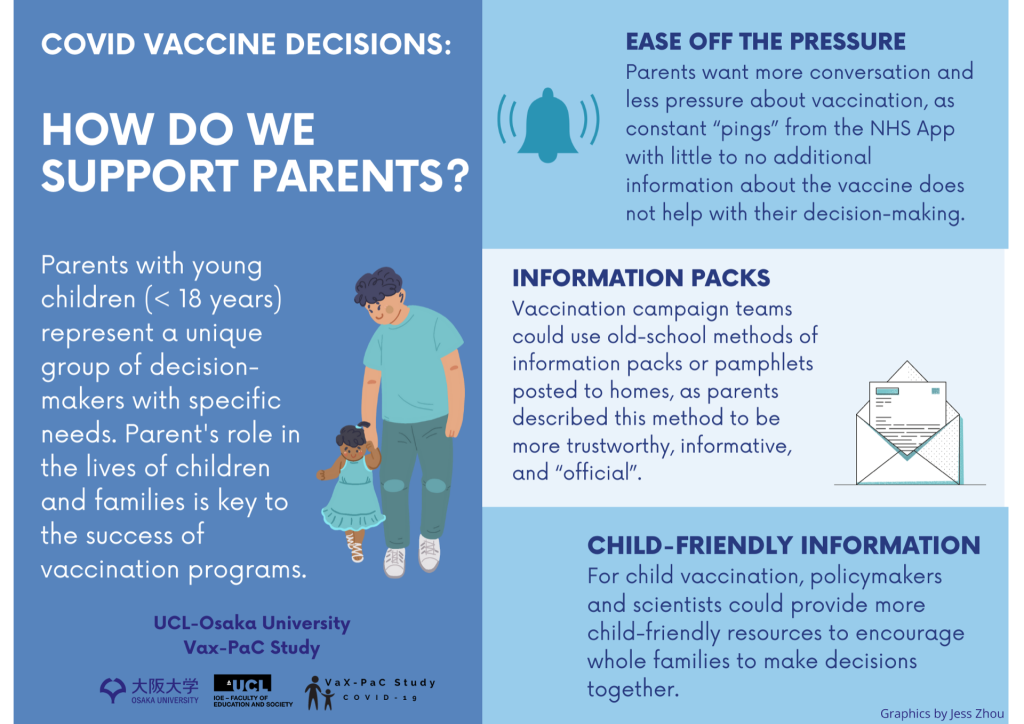 6 October 2022
6 October 2022
By Jess Zhou and Keri Wong
The COVID vaccine roll-out has been one of the most successful vaccination campaigns in UK history, yet not everyone is on board. Studies of adults report some 15% of the population are resistant to getting vaccinated and up to 35% indicate they are hesitant towards COVID vaccines. These figures are not dissimilar to hesitancy rates for other vaccines and can have real implications for ongoing public health messaging and global pandemic intervention strategies.
Parents with children under 18 – who make vaccination decisions for themselves and for their children – form one group in need of better support because vaccine decision-making is particularly challenging. Understanding how parents made decisions about the COVID vaccination and what support they needed is important as this is a much-neglected group in COVID public health messaging.
Our UCL Vax-PaC Study led by Dr Keri Wong (PI) and Asako Miura (co-I) aimed to find this out. Of the parents who took part in an earlier UCL-Penn Global COVID Study (April 2020-July 2021), 40 completed a short online survey on mental health and a one-on-one Zoom interview on vaccine decisions for themselves and their children between February and April 2022. A parallel arm of the study took place in Osaka Japan where 40 parents were recruited to allow for cross-cultural comparisons in vaccine decision-making, but the findings for that are presented in a report elsewhere and summarised as an animation.
The parents in our study varied in vaccination status:

Here’s what we found:
Parents’ key concerns
Making vaccine decisions for children was different to deciding for themselves
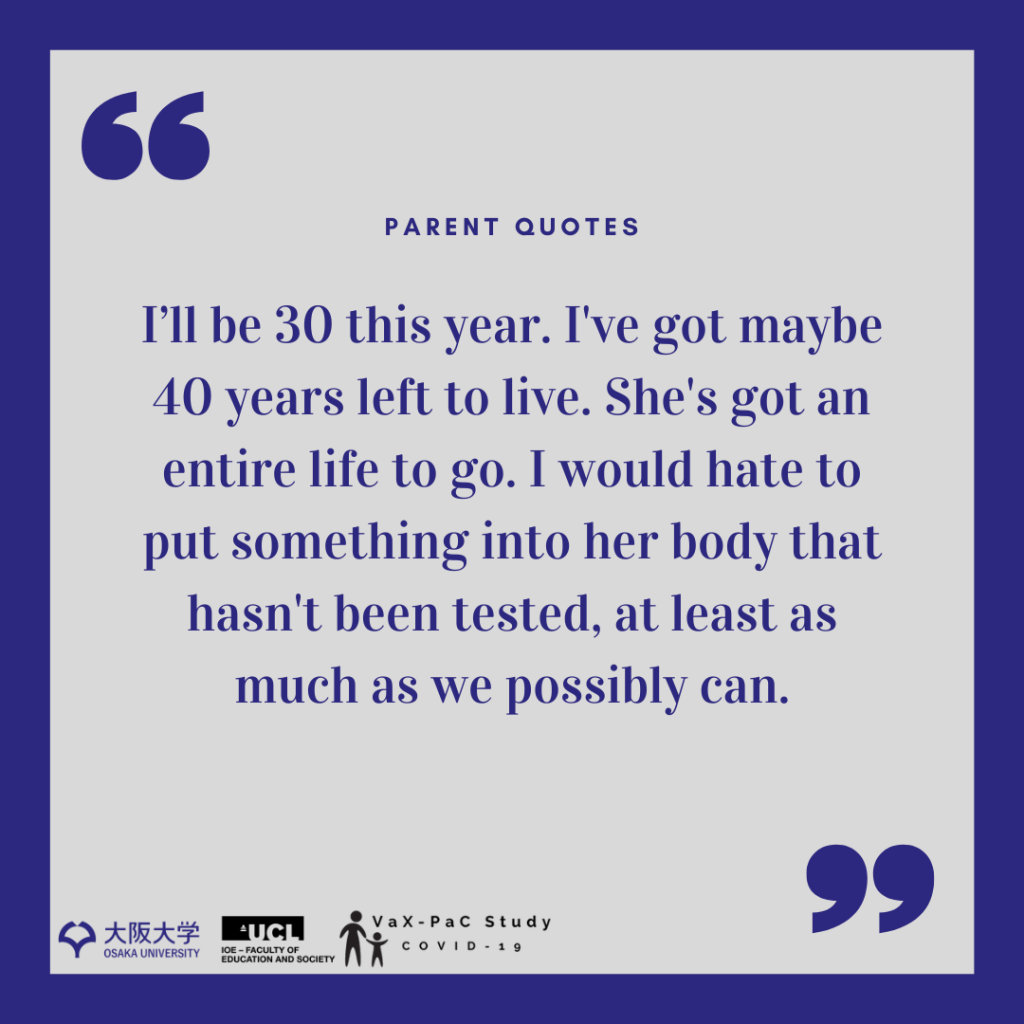
Quote from a parent
Conflicting information from experts about the necessity of vaccines for children fosters uncertainty and confusion.
The JCVI initially said children don’t need this. And that’s still very much in my mind is, well, if children don’t need it, why are we doing it? And the only reason we seem to be doing it is those who wish to travel.
Parents feel accountable when making decisions for children and more concerned about unknown long-term side-effects of vaccines.
Conducting their own research about the COVID vaccine was important

Quote from a parent
Accessing and comparing information independently was reassuring for some participants.
I mean I don’t trust them always for everything and whatever they say, but it was more that I’ve done my research and understand the science behind it, so I felt more confident and the decision I was making.
Weighing out the risks and benefits of the COVID vaccine was common
!["I don't agree with [all] the kind of conspiracy theories going around and, yes, you might have a reaction to it [the vaccine] but it's surely better than the alternative?"](https://blogs.ucl.ac.uk/ioe/files/2022/10/Unknown-10-1024x1024.png)
Quote from a parent
Some parents felt that the risks associated with catching COVID-19 were not enough to risk their child taking a vaccine that may have unknown, long-term side-effects.
Another thing that I’ve considered with the children is the benefit outweighing the risk. So, for example with polio vaccination program there was a very high risk from polio it was causing severe disablement and death. And the risk of a new vaccination program would have far outweighed that. But everything that we’ve been told so far in the pandemic is saying that children have very little risk… I didn’t want to take that risk, I just felt like my child was an experiment almost.
What support would parents like to receive?
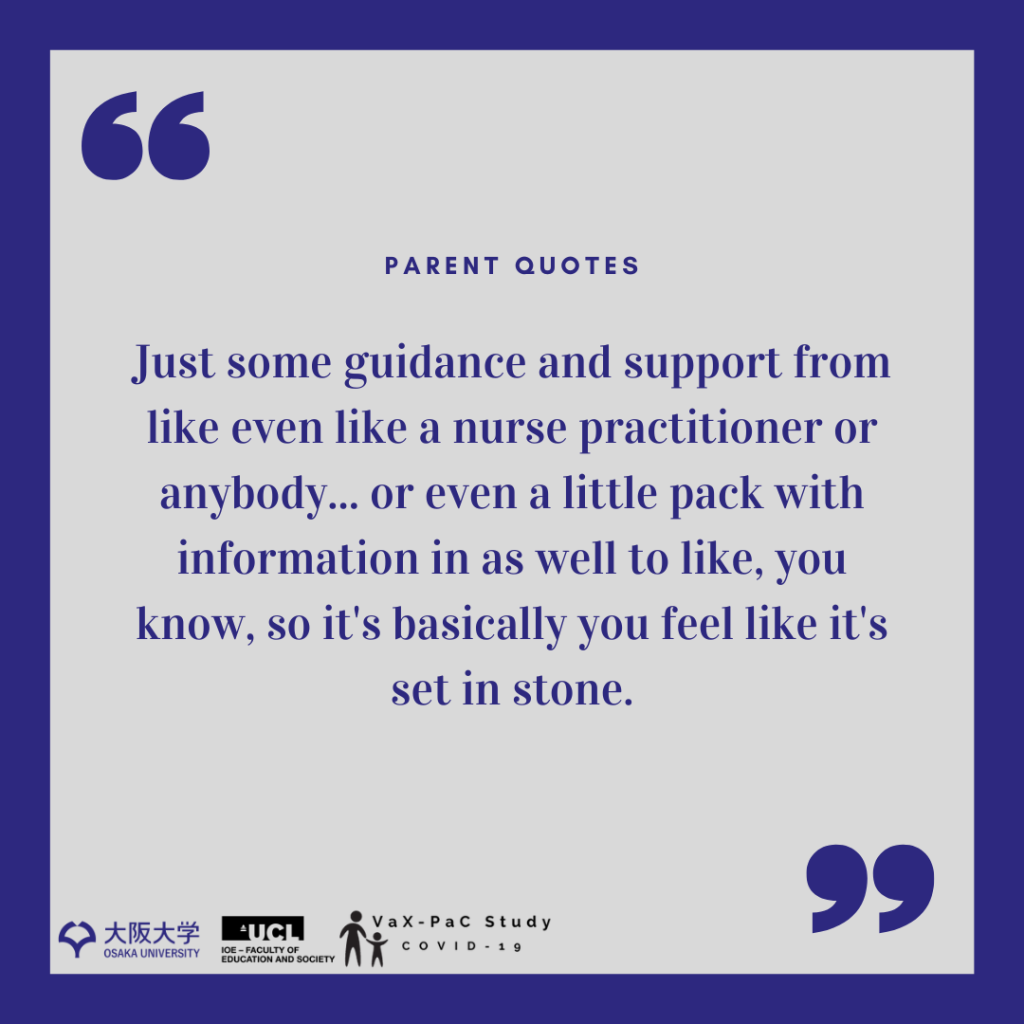
Quote from a parent
Suggestions for public health messaging
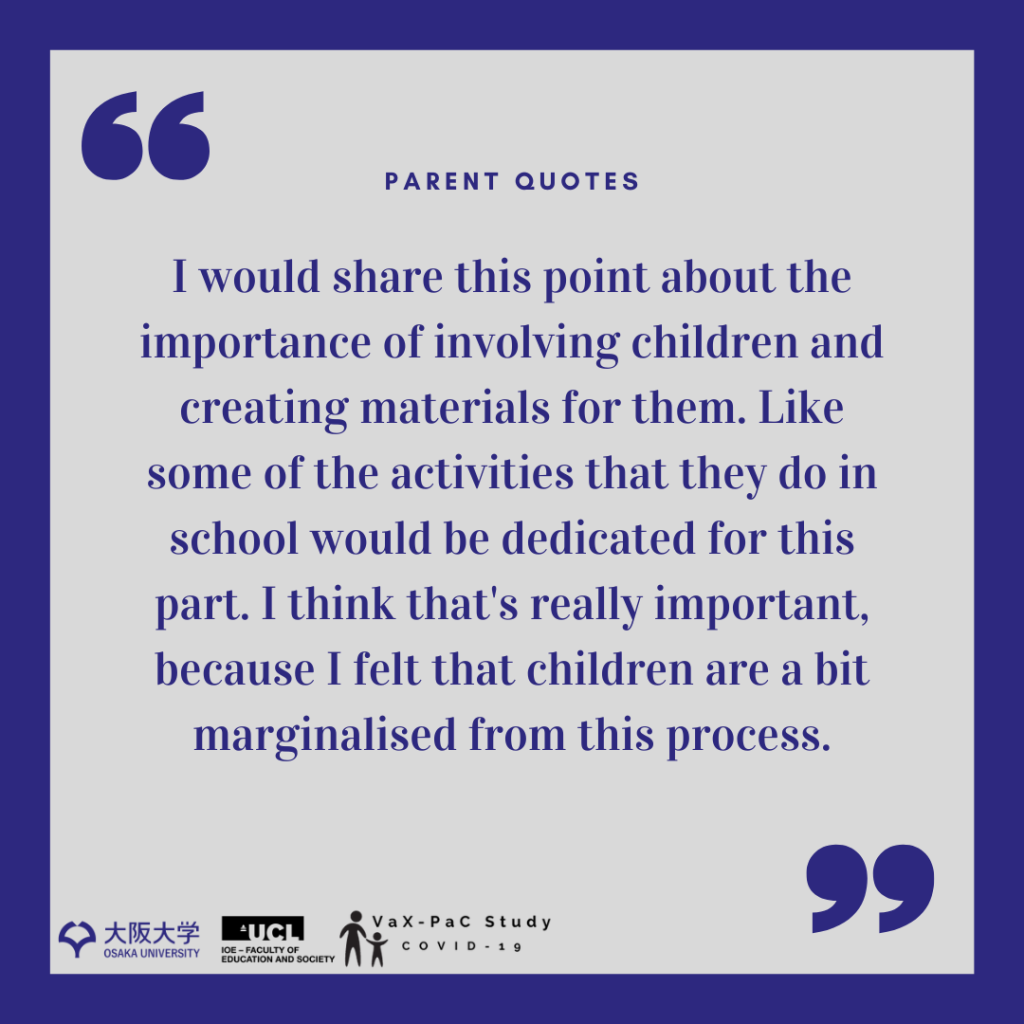
“I would share this point about the importance of involving children and creating materials for them. Like some of the activities that they do in school would be dedicated for this part. I think that’s really important, because I felt that children are a bit marginalised from this process.”
Parents commonly expressed feeling overwhelmed with the amount of information available. Some suggested that a traditional information pack or pamphlet sent home to parents and children would have been helpful, as would having key trusted figures like nurse practitioners and doctors to consult with the various individual health conditions and appropriateness of taking the jab.
Suggestions for child vaccination
Parents felt frustrated by the constant pressure to vaccinate children when previous claims contradict its necessity. Parents suggested involving children in the production process of co-creating child-friendly resources to support family vaccine decisions and bringing credible experts on the COVID vaccine topic to the forefront of clear messaging.
Suggestions for supporting the vaccine hesitant

“I think we do need to get that message from the joint vaccine, JVCI folk very, very clearly. Do the children need it or do they not? And why is it government policy or why are we insisting on it, I mean I get texts now every two days, vaccinate, vaccinate, but i don’t see why and I’m not buying into it.”
Parents often reflected on the importance of personal communication to support vaccine hesitant people.
It often usually helps if it’s someone who looks like them and talks like them, who talks to them, so that they can relate more easily and allows them, you know, in a non-patronising non-arrogant way “why is it that you don’t want to take the vaccine?”, and actually try to understand.
Many parents said more contact with their local health service providers, GPs or nurses would have helped them take their individual circumstances into consideration when deciding about the COVID vaccination. Perhaps having a credible question and answer forum for common questions raised by parents would also be beneficial. Some suggested having Accessible, clear, and accurate public messaging around the COVID vaccine from key knowledge influencers
Having sessions, I mean, even if they were like online sessions, so that some people like nurses, doctors, can speak to these people in their languages, if possible. I think that would be really helpful. Because lots of people were misinformed, and they did not, I mean if you look at the statistics, they did not receive any support.
I think in the UK, it’s not very commonly done, but I think maybe in some other countries, people like footballers or a very popular public figure would say, “yeah I had my jabs done and I feel better for it,” then people might go, “Oh well, I like him, if he’s doing that and he feels better for it and he’s okay, I might consider doing it.” Not the head of medical advisor who might communicate in slightly complicated language saying how important it is, you know. Something, someone a bit more accessible, somebody people can tune in with.
What are the impacts of these findings?
Parents with children under age 18 represent a unique group of decision-makers with specific needs. We must take into consideration that parents, who play an important role in their children’s and family’s lives, also play a crucial role in the success or failure of vaccination programs.
Our findings show that parents decide differently when it comes to their children, they are much more wary about vaccine side-effects and feel personally accountable for any adverse outcomes. Doing their own research for vaccine information was sometimes helpful but could also be confusing and overwhelming. Policymakers and key stakeholders could provide more child-specific information about the vaccine, for example the vaccine development stages or how dosages for children are calculated, to assuage some anxieties. Providing information in a relatable, jargon-free, and visual way could be more engaging and accessible for parents.
Parents also gave us great suggestions about how to encourage better dialogue and wider participation to increase vaccine acceptance. Policymakers and scientists could provide more child-friendly resources to encourage whole families to make decisions together. Parents also wanted more conversation and less pressure about vaccination, as constant “pings” from the NHS App with no additional information about the vaccine does not help with decision-making. Vaccination campaign teams could use more traditional methods of communication, such as information packs or pamphlets posted to homes, as parents described this method to be more trustworthy, helpful, and “official”.
Parents further suggested that more contact with their local GPs, nurse practitioners and health providers would have helped with vaccine decision-making. Advice and guidance from people whom parents know, trust and respect are key sources of support. If face-to-face contact is impossible, local health providers could arrange online community sessions or forums for parents to gather and share their concerns. Even just a 10–15-minute talk would have helped some parents to feel seen and supported by their community.
Vaccine success depends on everyone being on board. Parents are especially important, as their decisions have an impact on their children and often their wider family too. Understanding parents’ vaccine decision-making is therefore crucial to informing public health policy and strategy.
As one parent put it succinctly:
It is a really important individual decision, even though from a group perspective it might be obvious that this needs to be done from a sort of public policy or public health perspective. But we have to bring it down to an individual scale and make it as recognizable and relatable as possible for an individual.
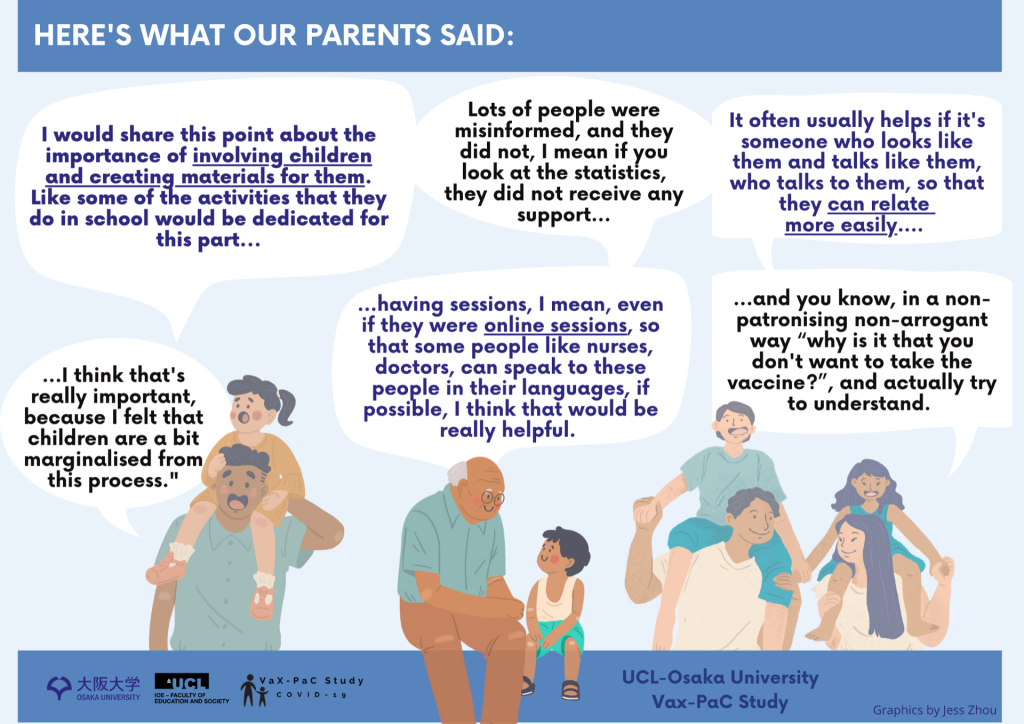
Watch the animation below which summarises the study findings
For more information on the country-specific findings and reports, please visit our OSF page . If these findings resonate with you and you’d like to share your ideas, visit VaxPacStudy.com or follow-us on Twitter and Instagram @VaxPacStudy.
The Vax-PaC Study team would like to thank UCL Global Engagement Fund and the UCL-Osaka Strategic Funding for making this research partnership possible. We would also like to give a special thanks to student researchers Jessica Zhou and Caroline Acin-Chediex who were pivotal in all study data collection and analysis, and Raul Sanchez Corredor, Isidora Castillo, Yuhe Wang and Natalie Fischer for their contribution at various stages of the project.
 Close
Close



